
What Are the Top Uses for a USB to HDMI Adapter?
USB to HDMI adapters have become essential tools for connecting devices and enhancing display capabilities. These adapters serve a wide range of uses, from professional presentations to gaming and home entertainment. Understanding their primary functions can help individuals maximize their potential. If you’ve been thinking about whether or not to buy the usb to hdmi lately, then you should definitely read on.
Top Uses for a USB to HDMI Adapter
Enhanced Visual Presentations
Presentations rely heavily on clear and vibrant visuals. USB to HDMI adapters allow users to connect laptops to external displays like projectors or large screens. This capability is crucial for professionals who need to deliver impactful presentations in conference rooms or lecture halls. By using an adapter, presenters can ensure their slides are displayed in high definition, capturing the audience’s attention and conveying information effectively. The seamless connection provided by these adapters also minimizes technical issues during crucial moments, making them indispensable for business and educational settings.
Boosting Productivity with Multiple Displays
In today’s fast-paced work environments, multitasking is key. USB to HDMI adapters enable users to connect multiple monitors to a single computer, significantly boosting productivity. With additional screen space, professionals can run different applications simultaneously, such as spreadsheets, documents, and communication tools. This setup is particularly beneficial for graphic designers, video editors, and programmers who require extensive screen real estate to manage complex tasks. The ability to extend or mirror screens without needing additional graphics cards makes these adapters cost-effective solutions for expanding workspaces. By alleviating the hassle of constantly switching between tabs and windows, USB to HDMI adapters contribute to more efficient workflows and reduced cognitive load.
Creating Home Entertainment Systems
Home entertainment enthusiasts find USB to HDMI adapters invaluable for building versatile media centers. These adapters allow users to stream content from laptops or desktops directly to televisions. Whether watching movies, playing video games, or browsing online content, the transition from small screens to larger displays enhances the entertainment experience. Families can enjoy movie nights with cinematic quality, while gamers benefit from improved graphics when playing on larger TVs. Additionally, these adapters support HD and 4K resolutions, ensuring crisp and detailed images. By bridging the gap between devices, USB to HDMI adapters make it easier to share digital content with family and friends, transforming living rooms into entertainment hubs.

Facilitating Remote Work and Learning
The shift towards remote work and online education has increased the demand for reliable tech solutions. USB to HDMI adapters support this transition by enabling efficient home office setups. Individuals working from home can connect their computers to external monitors, creating dedicated workspaces that mimic traditional office environments. This setup helps maintain focus and organization, critical elements for productivity. Similarly, students attending virtual classes can benefit from larger displays that make reading and interacting with study materials easier. Teachers can use adapters to conduct online lessons, sharing large-scale visual aids and demonstrations with students. By supporting versatile display configurations, USB to HDMI adapters play a pivotal role in adapting to modern work and learning demands.
Conclusion
Selecting the appropriate USB to HDMI adapter requires understanding specific needs and device compatibility. Factors such as resolution support, data transfer rates, and connector type should be considered. Researching and comparing options can ensure the best fit for individual requirements. By leveraging the capabilities of USB to HDMI adapters across various applications—presentations, productivity, entertainment, remote work, and gaming—users can enhance both personal and professional experiences. Making informed choices leads to better integration of technology into daily life, maximizing the potential of every connected device.


